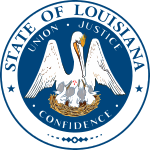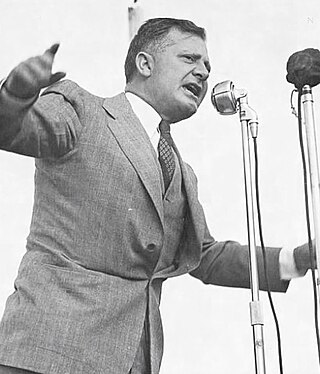
Earl Kemp Long was an American politician who served as the 45th governor of Louisiana for nine years. A member of the Democratic Party, he held the same position that his brother, Huey Long, held years earlier (1928–1932).
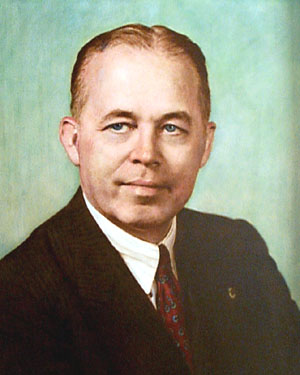
Samuel Houston Jones was an American lawyer and 46th Governor of Louisiana for the term from 1940 to 1944. He defeated the renowned Earl Kemp Long in the 1940 Democratic runoff primary election. Eight years later, Long then in a reversal of 1940 defeated Jones in the 1948 party primary.

Richard Webster Leche was an American attorney, judge, and politician, elected as the 44th Governor of the U.S. state of Louisiana. He served from 1936 until 1939, when he resigned. Convicted on federal charges of misuse of federal funds, Leche was the first Louisiana chief executive to be imprisoned.

The 1944 Louisiana gubernatorial election was held in two rounds on January 18 and February 29, 1944. Like most Southern states between the Reconstruction Era and the Civil Rights Movement, Louisiana's Republican Party was virtually nonexistent in terms of electoral support. This meant that the two Democratic Party primaries held on these dates were the real contest over who would be governor. The 1944 election saw the reformer ‘anti-Long’ faction retain power for another four years under Jimmie Davis.

The 1952 Louisiana gubernatorial election was held in two rounds on January 15 and February 19, 1952. Like most Southern states between the Reconstruction Era and the Civil Rights Movement, Louisiana's Republican Party was virtually nonexistent in terms of electoral support.

The 1960 Louisiana gubernatorial election was held on April 19, 1960.

Cleveland Dear Sr., was a two-term U.S. representative for Louisiana's 8th congressional district, since disbanded, a district attorney, a state court judge, and a candidate in 1936 for governor of Louisiana.
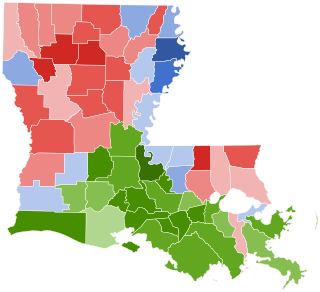
The 1924 Louisiana gubernatorial election was held in two rounds on January 15 and February 19, 1924. Like most Southern states between the Reconstruction Era and the Civil Rights Movement, Louisiana's Republican Party was virtually nonexistent in terms of electoral support. This meant that the two Democratic Party primaries held on these dates were the real contest over who would be governor. The 1924 election saw Henry L. Fuqua defeat Hewitt Bouanchaud to become Governor of Louisiana, and saw the beginning of the political rise of Huey P. Long Jr., who came in a surprisingly strong third.

The 1940 Louisiana gubernatorial election was held in two rounds on January 16 and February 20, 1940. Like most Southern states between the Reconstruction Era and the Civil Rights Movement, Louisiana's Republican Party was virtually nonexistent in terms of electoral support. This meant that the two Democratic Party primaries held on these dates were the real contest over who would be governor. The election resulted in the narrow defeat of Earl K. Long and the election of Sam H. Jones as governor of Louisiana on a reform platform.

The 1932 Louisiana gubernatorial election was held on January 19, 1932. Like most Southern states between the Reconstruction Era and the Civil Rights Movement, Louisiana's Republican Party had virtually no electoral support. This meant that the Democratic Party primary held on this date was the real contest over who would be governor. The election resulted in the election of Oscar K. Allen as governor of Louisiana. Louisiana was one of only two states that held the election on a date other than the first Tuesday following the first Monday of November.

The 1920 Louisiana gubernatorial election was held on April 20, 1920. Like most Southern states between the Reconstruction Era and the Civil Rights Movement, Louisiana's Republican Party had virtually no electoral support. This meant that the Democratic Party primary held on January 20 was the real contest over who would be governor. The election resulted in the election of John M. Parker as governor of Louisiana.

The political balance in Louisiana was heavily affected by the post-Hurricane Katrina departure from New Orleans. Heavily Democratic New Orleans lost some 1/3 of its population. The overall effect reduced the Democrats' base of support in the state and turned Louisiana into a Republican-leaning state thereafter. New Orleans remained Democratic, electing Mitch Landrieu as mayor in February 2010. In the 2008 elections, Louisiana sent a mixed result, with the election of U.S. Senator John McCain for President and the reelection of Democratic U.S. Senator Mary Landrieu. The other senator, at the time, was Republican David Vitter.

The 1948 Louisiana gubernatorial election was decided by a Democratic primary held in two rounds on January 20 and February 24, 1948, which was tantamount to election. The 1948 election saw the defeat of Louisiana's reformer "anti-Long" faction and the election of Earl Kemp Long to his first full term as governor.

The 1916 Louisiana gubernatorial election was held on April 18, 1916. Like most Southern states between the Reconstruction Era and the Civil Rights Movement, Louisiana's Republican Party was virtually nonexistent in terms of electoral support. This meant that the Democratic Party primary held on January 25 was supposed to be the real contest over who would be governor. However, in this particular election Progressive Party nominee John M. Parker ran an unusually competitive campaign, garnering 37% of the general election vote. The election resulted in the election of Democrat Ruffin G. Pleasant as governor of Louisiana.

The 1912 Louisiana gubernatorial election was held on April 16, 1912. Like most Southern states between Reconstruction and the civil rights era, Louisiana's Republican Party had almost no electoral support. This meant that the Democratic Party primary held on January 23 was the real contest over who would be governor. The election resulted in the election of Democrat Luther E. Hall as governor of Louisiana.

The 1908 Louisiana gubernatorial election was held on April 21, 1908. Like most Southern states between Reconstruction and the civil rights era, Louisiana's Republican Party had minimal electoral support because of the mass disenfranchisement of African Americans. This meant that the Democratic Party primary held on January 28 was the most important contest to determine who would be governor. This election marked the first time Louisiana used primaries to nominate party nominees. Republicans nominated Henry Newton Pharr, son of the party's 1896 nominee, John Newton Pharr. The election resulted in the election of Democrat Jared Y. Sanders Sr. as governor of Louisiana.
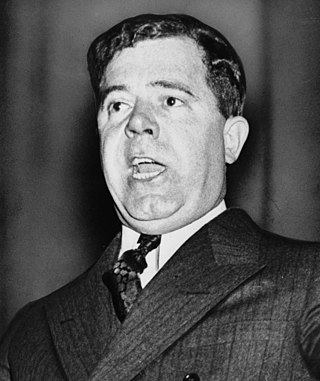
The 1930 United States Senate election in Louisiana was held on November 4, 1930.

The 1936 United States Senate special election in Louisiana took place on April 21, 1936, to fill the remainder of the late former Senator Huey Long's six-year term. Long was first elected to the Senate in 1930 and was assassinated on September 10, 1935.

United States gubernatorial elections were held in 1935, in three states. Kentucky, Louisiana and Mississippi hold their gubernatorial elections in odd numbered years, every 4 years, preceding the United States presidential election year.
